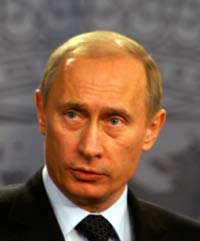Hopes are high that China and Russia will agree during Russian President
Vladimir Putin's upcoming visit to Beijing to build an oil and gas pipeline,
with energy issues expected to dominate his trip.

Russian President
Vladimir Putin |
The two-day visit beginning
Tuesday comes as the giant neighbors enjoy increasingly warm ties and rising
bilateral trade.
Aside from the pipeline and trade, the Iran and North Korea nuclear standoffs
and anti-terrorism cooperation will be high on Putin's agenda, Russian and
Chinese officials said at press conferences in Beijing last week.
Of highest interest for China is gaining a stable source of oil and gas from
Russia, the world's second biggest oil exporter after Saudi Arabia, to feed its
booming economy.
Russia plans to deliver 15 million tons of crude -- an increase of 25 percent
-- to China by rail this year.
But China is counting on the pipeline, which Russia has said it would start
building from Siberia to the Pacific Rim this year, to deliver much more.
While Moscow has said supplies will reach China, Beijing is lobbying for a
branch of the pipeline to go directly to the Chinese border amid nervousness
that Japan will receive preferential treatment.
Corporations from Russia and China have begun negotiations, but talks have
yet to yield results.
Zhu Feng, a professor at the Beijing University School of International
Studies and a respected Chinese expert on regional issues, said there could be a
deal signed during Putin's visit.
"The possibility of signing a Siberia-China pipeline agreement is very big,"
Zhu told AFP.
Negotiations had been stalled over who would pay for the construction, but
Zhu said the two sides may have have come to an agreement that China would pay
for most of it, as most of the branch would fall in Chinese territory.
"What I've heard is the part in China will be paid by China and the part in
Russia will be paid by Russia," Zhu said.
"Construction could begin late this year or early next year."
Other analysts, however, are not so sure, citing the difficult issues of how
much supply Moscow would guarantee China and Japan, and whether Siberia had
enough oil to satisfy both Asian economies.
"I don't know if there's enough oil coming through the pipeline to make both
sides happy," said David Zweig, an expert on Asian energy politics at the Hong
Kong University of Science and Technology.
Currently eight percent of China's energy needs come from Russia, compared
with 45 percent from the Middle East.
Beijing hopes to boost Russia's share to around 15 percent with the pipeline
in three to five years, Zhu said.
Russian Ambassador to China, Sergei Razov, who was at the joint press
conference with Chinese officials on Thursday, declined to specify whether a
pipeline deal would be signed.
He cautioned time was needed to determine the specifics of the project, but
also expressed hope for energy deals to be clinched.
Assistant Chinese foreign minister Li Hui told reporters the two sides would
issue an important joint communique and several agreements would be signed, but
he did not provide details.
Russia's Itar-Tass news agency said Russian gas giant Gazprom would ink an
agreement with China National Petroleum Corporation (CNPC) during the visit,
which will finalize a price policy for Russia's gas exports to China.
Shifting the structure of trade, which is currently focused on oil and
weapons exports from Russia, is also expected to be discussed.
Razov said Moscow would like to see trade expanded from merely supplying
natural resources to production and investment, especially in the fields of
timber processing, aquaculture, natural gas, service and tourism.
Bilateral trade reached nearly 30 billion dollars last year, a 37.1-percent
increase from 2004, but Razov said the rise had much to do with the higher costs
of natural resource exports from Russia, such as oil.
The Iran and North Korea nuclear standoffs will also be discussed, the two
countries said.
China and Russia, both permanent members of the UN Security Council with
veto-wielding powers, are important players in both crises.